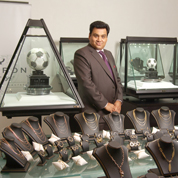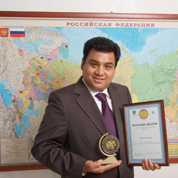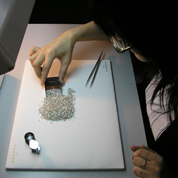Choron Diamond CEO highlights the right recipe for business success in Russia

This current year marks the 10th anniversary of your company Choron Diamond in Russia, a significant feat, given the landmark changes that had occurred in this country over this period. If briefly put, what are the key factors behind such sparking success?
First is the desire. We are passionate about what we do and I believe it is the key factor to any success. If speaking of more concrete and material things, I would go for innovations and technologies. We follow all the changes occurring in the production industry all over the world, and having offices in six major jewelry centers, helps a lot to do that. And we use these latest technologies to make jewels that fully satisfy all our customers’ needs. We are not stuck in a moment, as we are constantly searching for something new to present to our clients.
Your company is in the industry that sells goods, which are traditionally classified as ‘luxury’ in contrast to ‘necessity products.’ In this regard, how would you describe your typical Russian clients and their tastes vis-a-vis other residents of other countries, where your parent company also has offices?
“‘Choron’ is a ritual cup used by Yakuti, and it symbolizes ‘hospitality’ and ‘fraternity.’ I have chosen it as our corporate name because of its symbolic meaning. Besides, I also wanted to maintain close relationship with the Russian republic of Yakutia, which has given me so much.”
The geographical position of Russia and its ethnical diversity lead to the fact that its citizens have different tastes. For instance, Russian women can wear both minimalist jewels, which are top fashion in the Western world, and sophisticated Asian jewels with ethnic motifs. Less bound by tradition, women here eagerly welcome the latest fashions and ancient graphics. They are also very determined when they really want to buy a jewel. They can economize on everything else, but they will buy it.
So, as one of the key players on the Russian jewelry and related products market, how would characterize this industry today and its future perspectives?
The current global financial crisis has considerably influenced the conditions on the Russian and world jewelry markets, but, nevertheless, they hide a huge potential. In terms of diversity and richness, Russia has unique natural resources of precious metals and stones, which have been successfully processed from times immemorial. With the flow of new investments into the local industry, and on the condition of active experience exchanges with foreign partners, the Russian jewelry market has all the chances to reach the highest level. The enthusiasm of the Russian consumers, who are willingly buying jewels, will also significantly boost this positive trend. Naturally, the crisis has negatively influenced the purchasing capacity and has slowed down the manufacturing process, but sooner or later this spell of bad luck for the whole world will come to an end.
The impacts of the current global economic crisis, according to most experts, have not been so damaging to the precious metals in general and jewelry  markets in particular, as they have been to such economic locomotives as the banking, real-estate sectors, etc. Do you agree with this view, and why?
markets in particular, as they have been to such economic locomotives as the banking, real-estate sectors, etc. Do you agree with this view, and why?
That is certainly not true. As you have mentioned it earlier, jewelry belongs to the luxury class of goods, which are always the first to take the hit during any crisis, as jewels are among the first things that rational consumers start to economize on. As a person, who knows this industry in and out, I can tell you that it has been hit really badly.
The next question is about your famous corporate brand name, ‘Choron Diamond.’ This name is not etymologically transparent, as is usually the case in your industry. What does this name mean, and how has it come to represent one of the most globally recognized Indian brands on the jewelry markets?
Lots of people have asked me this question over these years, and I have also heard numerous versions of what it might mean. In fact, the word, ‘Choron’ is a ritual cup used by Yakuti, and it symbolizes ‘hospitality’ and ‘fraternity.’ In case with the name of our company, it reflects the unity of the nations and friendship among their representatives, who are working together for Choron. I have chosen it as our corporate name because of its symbolic meaning. Besides, I also wanted to maintain close relationship with Yakutia, the Russian republic, which has given me so much.
Over the years, you have been awarded many honorable awards and diplomas. Lately you received the title of the ‘Best Russian Exporter in 2008.’ Despite all these tremendous achievements, it will be wrong to assume that you are now ready to rest on laurels. In this regard, what are your new plans for broadening your company’s operations in Russia?
First, in the new jewelry season, we are introducing a new collection of rings with solitaires up to three carats. As for the marketing strategy, we have taken a new track: addressing the customers directly. Thus, we plan to launch our own network of shops in the nearest future.
Recently, Choron Diamond, in partnership with the Russian football authorities, launched an eponymous trophy for the best soccer club in Russian premier league at the end of each season. Is this a manifestation of the so-called ‘corporate social responsibility’ or was this unique gesture driven by other considerations?
“With the flow of new investments into the local industry, and on the condition of active experience exchanges with foreign partners, the Russian jewelry market has all the chances to reach the highest level.”
I have always said that I am very grateful to Russia because it has taught me a lot. Actually, now, I am who I am in many ways, thanks to the experience I have received here, which I would not have been able to find anywhere else. This is why I wanted to institute a special prize in this particular country. In a way, you might call it ‘corporate social responsibility’ because we want our prize to become a stimulus to young footballers. You know, there have been lots of discussions on how to help to develop youth football in Russia, but little has been done. This prize is a real chance for the youth teams to contribute to the victory of their clubs. They are worth being given such responsibility because our future lies in their hands and they must learn.
It is often said that successful businesspeople sacrifice a lot — hobbies, time for friends and family members, etc. — to attain their goals in life. Do you agree with this assertion, and if not, how do you manage to balance this delicate equation between corporate and other life necessities?
Of course, having one’s own business considerably limits one’s leisure time. Nevertheless, my family is the most important thing in my life. I always find time to 
And lastly, as a businessman in a foreign land, how do you see the role of businesses in promoting bilateral ties between nations in general, and between Russia and India, the two countries that are now closest to your heart, in particular?
They are, indeed, very important. Whatever decisions are taken at the intergovernmental levels, they will remain on paper, unless real cooperation starts. And that is what businesses are actually for. International companies provide representatives of different nations the real chance to work together, understand one another and learn more about each other’s cultures. There are certain difficulties to overcome, as people of different cultures usually think differently. But with time, their horizons widen and they form a very successful team. Our company is a living proof of this fact.
Daria Voloshina took an active part in the preparation of this interview.












 Web design,
Web design,